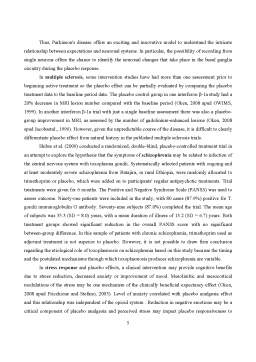Extras din proiect
The placebo effect
The operational definition of a placebo effect is any health effect measured after an intervention that is something other than a physiological response to a biologically active treatment. In clinical trials the placebo effect is any measured response in the group of study subjects that received an inert treatment, such as a dummy pill. A sham treatment (the placebo) is given, but the patient believes it is effective and expects a clinical improvement. The placebo effect, or response, is the outcome after the sham treatment. Therefore, it is important to emphasize that the study of the placebo effect is the study of the psychosocial context around the patient. Thus, “the” placebo effect is not a single effect but the net result of many different factors, including expectations of clinical improvement and classical conditioning. So far, most of the neurobiological mechanisms underlying this complex phenomenon have been studied in the field of pain and analgesia, although recent investigations have successfully been performed in the immune system, motor disorders, and depression. Overall, the placebo effect appears to be a very good model to understand how cognitive and emotional processes that are engaged during the administration of a placebo interact with different neuronal systems, thus being capable of activating internal mechanisms that modify physiology (Colloca and Benedetti, 2005; Finniss and Benedetti, 2005).
The study of the placebo effect, at its core, is the study of how the context of beliefs and values shape brain processes related to perception and emotion and, ultimately, mental and physical health. The study of the placebo effect reflects a current neuroscientific thought that has as its central tenet the idea that "subjective" constructs such as expectation and value have identifiable physiological bases, and that these bases are powerful modulators of basic perceptual, motor, and internal homeostatic processes (Benedetti et al., 2005).
For example, subjects in clinical studies want to get better, they want to believe they are on the active experimental treatment and that it works, they want to feel that the time and effort they have invested is worthwhile, and they want to make the researchers happy. In turn, the researchers want their treatment to work and want to see their patients get better. So there is often a large reporting bias. In other words, subjects are likely to convince themselves they feel better, and to report that they feel better, even if they don’t. Also, those conducting a trial will tend to make biased observations in favor of a positive effect.
It has also been clearly demonstrated that subjects who are being studied in a clinical trial objectively do better. This is because they are in a clinical trial – they are paying closer attention to their overall health, they are likely taking better care of themselves due to the constant reminder of their health and habits provided by the study visits and attention they are getting, they are being examined on a regular basis by a physician, and their overall compliance with treatment is likely to be higher. So basically, subjects in a trial take better care of themselves and get more medical attention than people not in trials. If for those not in a clinical trial, if they decide to do something about their health by starting a new treatment, they are likely to engage in more healthful behavior in other ways.
The neurobiology of placebo responses
The neurobiology of the placebo effect was born in 1978, when it was shown that placebo analgesia could be blocked by the opioid antagonist naloxone, which indicates an involvement of endogenous opioids (Benedetti et al., 2005 apud Levine et al., 1978). By using this pharmacological approach with naloxone, several other studies have confirmed and extended this observation, finding the following events that might take place in the brain after placebo administration:
- placebo administration (psychosocial context) might reduce pain through opioid and/or non-opioid mechanisms via expectations and/or conditioning mechanisms;
- the respiratory centers may also be inhibited by endogenous opioids;
- the β-adrenergic sympathetic system of the heart may also be inhibited during placebo analgesia, although the mechanism is not known (reduction of the pain itself and/or direct action of endogenous opioids);
- CCK (cholecystokinin) antagonizes the effects of endogenous opioids, thereby reducing the placebo response;
- placebos can also act on 5-HT-dependent hormone secretion, on both the pituitary and adrenal glands, thereby mimicking the effect of the analgesic drug sumatriptan (Colloca and Benedetti, 2005).
Preview document
Conținut arhivă zip
- Neurobiological Mechanisms of Placebo Responses.doc











